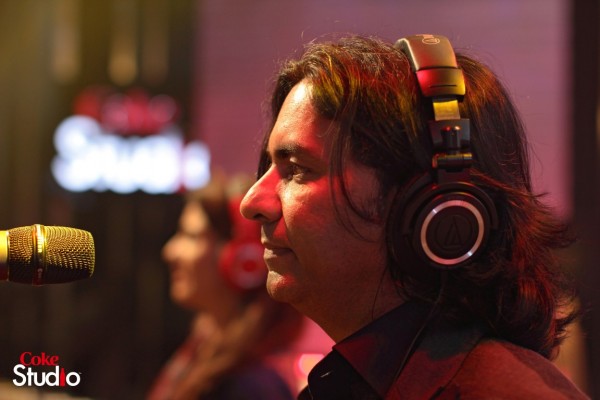Coke Studio releases Final Episode of Season Seven featuring ‘Suth Gana’ by Sajjad Ali, ‘Pani Da Bulbula’ by Abrar-ul-Haq, ‘Za Sta Pashan Na Yam’ by Naseer and Shahab and ‘Huns Dhun’ by Ustaad Rais Khan.
[Pakistan: 23rd November 2014] Following episode 6 of the music platform, #CokeStudio7 is all set to release the seventh and final episode of the current season, which will air on Sunday 23rd November 2014 across all leading broadcast networks nationwide featuring ‘Suth Gana’ by Sajjad Ali, ‘Pani Da Bulbula’ by Abrar-ul-Haq, ‘Za Sta Pashan Na Yam’ by Naseer and Shahab and ‘Huns Dhun’ by Ustaad Rais Khan.
Few artists have the ability to juxtapose the traditional with the popular quite like Sajjad Ali does. Right from the moment ‘Suth Gana’ begins with him showing off his classical roots to the infectious refrains of this humorous song, Sajjad Ali reminds the listeners of the range of both his voice and intellect. Suth Gana literally translates into “throw a song in”, and according to Sajjad Ali himself it is a phrase yelled out by cinema audiences when a film reaches a suitable point for a song. Yet this playful message is used to capture a profound message in the lyrics, which exhorts people to persevere at what they do well, even when it gets difficult, because that is the only route to success. The arrangement by the Coke Studio team was calibrated to allow Sajjad Ali’s humour and its inherent gravitas to both come through. The flute accompanies the vocals as a distinctive flourish of bravado, while the banjo serves to provide a sense of wisdom and reflection. Both of these instruments also ensure that the composition retains an element of the conversational, allowing the lyrics to reach out to the audience asking for Suth Gana.
The coming together of Abrar-ul-Haq and ‘Pani Da Bulbula’ is a union of one of Pakistan’s most popular artists with one of its most popular songs. The song, which has its roots in Punjabi folk music, originally became famous through the rendition of Atif Yaqoob in the 1970s. Its infectious rhythm and the ability to adapt the lyrics to contemporary references meant that it was able to evolve, later featuring in the classic PTV drama Waris in the 1980s, and then appearing on the soundtrack of the critically acclaimed film Zinda Bhaag in 2013. That last version was sung by Abrar, and his return to Coke Studio with this song marks a composition of great joy and exuberance. The basic lyrics are quite simple and timeless, reminding us that life is fragile and finite and thus that’s how we should approach our troubles as well. Yet what makes them come alive in each rendition is the breathless, rap-style of their delivery, which has always retained its capacity to delight. To add to those emotions, the house band utilised a whole range of instruments and inflections, such as the melodica and the ukulele. These come together to recreate a classic which will end up enchanting another generation of Pakistanis.
When Naseer and Shahab first released ‘Coke Studio Releases Final Episode (Episode 7) of Season Seven’, the song took Pakistan by storm. Although several musicians had released well-received versions of pop and rock songs sung in Pushto, this was perhaps the first to crossover into the mainstream. The remarkably catchy chorus, which translates into “I am not like you”, is a rejoinder to those obsessed with material gains and advantages. The lyrics continuously reaffirm the ability to love as being the one thing that what sets us apart from those chasing shallow pursuits. The song’s original had a stadium-rock feel to them, and the Coke Studio version seeks to amplify that with the inclusion of legendary guitarist Faraz Anwar. The veteran musician specifically requested the producers to let him join in on the track, which had the space and the mood that allowed him to launch into one of his trademark performances. The rest of the house band has also structured its compositions to allow the entire song to be an even grander version of its own self while retaining the distinctive identity which had led to its original success.
Ustaad Rais Khan Sahib is one of the Subcontinent’s most revered musicians, and hails from a family of classical musicians going back thirty generations. His father, Ustaad Mohammed Khan, started giving lessons to his son when he was only two and a half years old and he was soon a virtuoso on the sitar. One of Ustaad Rais’s most distinctive styles is the “Gayaki Ang” or vocal style of sitar playing which had been developed and perfected by his elders. He brings that style here to ‘Huns Dhun’, which is said to have been based on Raag Hamsadhwani, a south Indian classical pentatonic raag. Hamsadhwani and Huns Dhun both translate into ‘Sound of Swans’ and this rendition brings that sense of elegance and beauty inherent in the chosen symbol. When performing with such musical legends, the onus on the house band is often to create the setting where they can take center stage. Thus the accompanying percussions and the piano are both subdued here, looking to be heard only when Ustaad Rais’s mesmerizing performances requires them to.







































